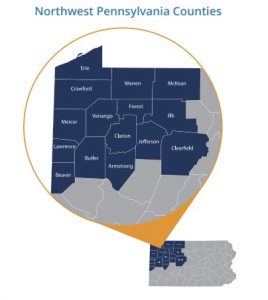Suicide Prevention: How to Bring Up the Tough Questions
 The Northwest Pennsylvania (NW PA) Veteran Suicide Prevention Program operates on a three-pronged approach involving healthcare providers, community organizations, and Veterans and their families. The PA Department of Military and Veterans Affairs (DMVA) is an active partner and responsible for ensuring that the Program integrates current Veteran suicide prevention initiatives throughout the state of Pennsylvania. The following information can be shared with all interested individuals and organizations throughout the state (and beyond).
The Northwest Pennsylvania (NW PA) Veteran Suicide Prevention Program operates on a three-pronged approach involving healthcare providers, community organizations, and Veterans and their families. The PA Department of Military and Veterans Affairs (DMVA) is an active partner and responsible for ensuring that the Program integrates current Veteran suicide prevention initiatives throughout the state of Pennsylvania. The following information can be shared with all interested individuals and organizations throughout the state (and beyond).
Please reach out to us if you have any questions or would like to speak with someone about publicizing the NW PA Veteran Suicide Prevention Program in your community.
Read time: 4 minutes
Having a meaningful conversation about suicide with Veterans
By Matthew Miller
Executive Director, VA Suicide Prevention Program
 How do you spot signs of struggle and have that difficult conversation with a Veteran contemplating suicide? We all probably encounter the same version of the same conversation at least once a day. Either you ask the question, or someone asks you: How are you? How do you answer? I would bet many people have a similar answer: I’m fine. But are you really fine? Or are you just being polite? Or answering on autopilot? Or maybe you don’t want to burden anyone with what you’re going through? Many of us, for a variety of reasons, can identify with not answering this question truthfully. But what do you do if a Veteran friend or family member tells you they’re fine, but you can see signs they’re struggling?
How do you spot signs of struggle and have that difficult conversation with a Veteran contemplating suicide? We all probably encounter the same version of the same conversation at least once a day. Either you ask the question, or someone asks you: How are you? How do you answer? I would bet many people have a similar answer: I’m fine. But are you really fine? Or are you just being polite? Or answering on autopilot? Or maybe you don’t want to burden anyone with what you’re going through? Many of us, for a variety of reasons, can identify with not answering this question truthfully. But what do you do if a Veteran friend or family member tells you they’re fine, but you can see signs they’re struggling?
How to recognize signs of crisis
The idea of talking to anyone about suicide can feel uncomfortable or awkward. But small actions, like taking a few minutes to have a conversation with a Veteran you care about, can make a big difference. You can start by looking for signs of crisis. Although every Veteran is different, and many may not show any obvious signs of intent to kill themselves, some actions and behaviors can be a sign they need help.
Starting the conversation
 Whether you spot any signs of crisis or not, it’s important to have a conversation if you think something is wrong. You don’t have to be an expert to talk to a Veteran facing challenges. You just need to show genuine care and concern. You can read through our crisis conversation handout to learn about some things to keep in mind before you talk with the Veteran.
Whether you spot any signs of crisis or not, it’s important to have a conversation if you think something is wrong. You don’t have to be an expert to talk to a Veteran facing challenges. You just need to show genuine care and concern. You can read through our crisis conversation handout to learn about some things to keep in mind before you talk with the Veteran.
- Make supportive and encouraging comments. Don’t ask invasive personal questions.
- Don’t inject judgment or emotion in the conversation. Stay calm.
- Listen more than you speak. Don’t dominate the conversation.
- Remind them you are there for them.
- Let them decide how much to share.
When you and the Veteran are ready to talk, here are some ways to start the conversation. You can use these as a guide for talking in person or via phone or text:
- “It sounds like you’re feeling incredibly (insert appropriate feeling here – trapped, overwhelmed, betrayed, etc.). Sometimes when people feel this way, they think about suicide. Is this something you’re thinking about?”
- “When did you first start feeling like killing yourself?”
- “Did something happen that made you begin to feel like taking your life?”
 When responding to answers from a Veteran, remember that simple, reassuring feedback goes a long way in showing support and encouraging seeking help:
When responding to answers from a Veteran, remember that simple, reassuring feedback goes a long way in showing support and encouraging seeking help:
- “I’m here for you. How do you hurt and how can I help?”
- “Can we talk for a while and see if we can find a way to keep you safe right now?”
Although you hope your friend or loved one isn’t considering suicide, what if they say they are? Follow these steps:
- Inform them they can dial 988, then press 1 to reach the Veterans Crisis Line or ask if they’d like to call together.
- Assess whether the Veteran is in crisis, and then determine if he or she has already initiated a plan to kill themselves or injure others, or has an immediate plan to do so, with access to means.
- Try to find out where the Veteran is located and whether anyone else is nearby.
- For immediate emergency or medical assistance, call 911.
Remember: Asking if someone is having thoughts of suicide will not give them the idea or increase their risk. It may seem daunting, but it could save their life. A simple “How are you?” could end up being a discussion about suicide. Being prepared to have this conversation is key because even if the Veteran doesn’t ask for support, they may need it, and this one talk could help keep them safe.
Participate in QPR (Question. Persuade. Refer) Gatekeeper Training for Suicide Prevention
Question, Persuade, Refer (QPR) training can help develop risk awareness and confidence in having open conversations with loved ones. QPR is a 2-hour evidence-based program in which individuals are educated about the warning signs of a suicide crisis then taught how to respond, how to offer hope, and how to get help.
- Recall facts about suicide and suicide prevention.
- Identify warning signs of suicide.
- Demonstrate how to ask someone directly about their desire or intent regarding suicide.
- Demonstrate verbal and nonverbal skills used to persuade someone who is having thoughts of suicide to seek and accept help.
- Identify local resources available to help someone who is having thoughts of suicide.
- Describe how to get help for someone having thoughts of suicide.
Please contact us with any questions or to schedule a training session for your business, community organization, or professional association. A printable pdf of our training course list is available to download and share.
Looking to Get Involved?
 Whether you identify as a healthcare provider, community organization, or Veteran, there are several opportunities through the NW PA Veteran Suicide Prevention Program and PERU to connect to resources, participate in educational training, and promote harm reduction strategies. We are actively recruiting healthcare and community partners to work with us in meeting our goals and objectives. To learn more, visit the program website at theresilientveteran.org.
Whether you identify as a healthcare provider, community organization, or Veteran, there are several opportunities through the NW PA Veteran Suicide Prevention Program and PERU to connect to resources, participate in educational training, and promote harm reduction strategies. We are actively recruiting healthcare and community partners to work with us in meeting our goals and objectives. To learn more, visit the program website at theresilientveteran.org.
Need Help? Know Someone Who Does? Contact the National Suicide Prevention Lifeline at 988 or use the online Lifeline Crisis Chat. Both are free and confidential. You’ll be connected to a skilled, trained counselor in your area.

